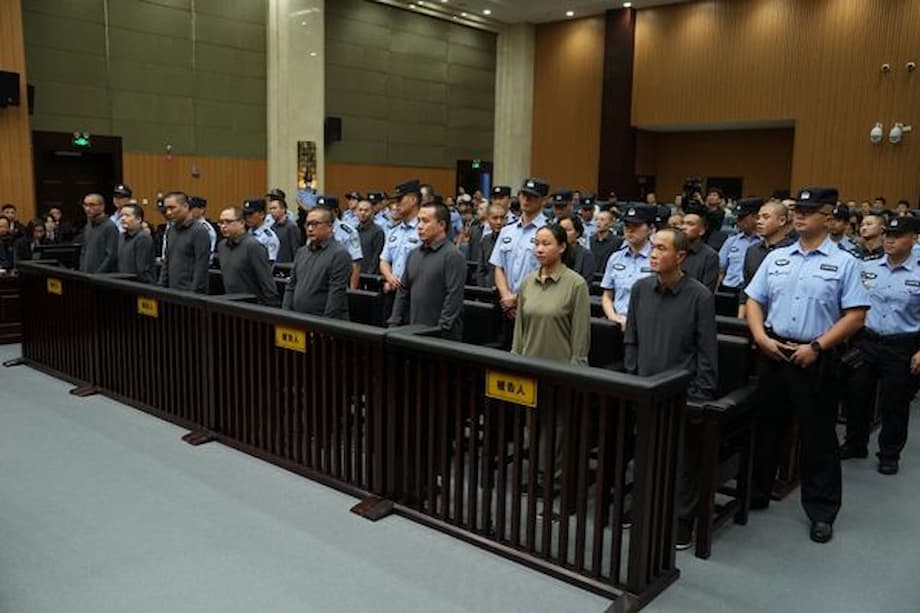Inside the verdict that targeted a Myanmar scam empire
A court in eastern China has imposed some of the harshest penalties yet in a campaign against transnational online fraud, sentencing 11 members and associates of the Ming family to death for leading a vast scamming and gambling enterprise based in northern Myanmar. The Wenzhou Intermediate Peoples Court in Zhejiang province found that the family network used armed control of compounds in the Kokang region to run telecommunications fraud, illegal casinos, organized prostitution, and drug trafficking. Prosecutors said the syndicate caused the deaths of workers who tried to flee or disobeyed orders, with the court attributing at least 10 deaths to the groups actions.
- Inside the verdict that targeted a Myanmar scam empire
- How a border enclave became a global fraud hub
- How the scams worked and why they spread
- A turning point in late 2023 and a surge in arrests
- The human toll inside the compounds
- Why China could try the case at home
- What happens next for the scam economy
- Key Points
Five additional defendants received death sentences with a two year reprieve, a penalty that in practice is often commuted to life in prison if no serious crimes are committed during the reprieve period. Twelve more were handed prison terms ranging from five to 24 years. Among those convicted were leading family figures tied to the Kokang Border Guard Force and to well known compounds in Laukkaing, the Kokang capital near Chinas Yunnan border. The family patriarch, Ming Xuechang, died in custody in late 2023 after Chinese authorities issued arrest warrants as part of a broader crackdown.
Who was sentenced and for what
The court named ringleaders including Ming Guoping, a key figure in the Kokang Border Guard Force, his relative Ming Zhenzhen, and associate Zhou Weichang. Charges centered on the creation of a criminal enterprise that, since 2015, built a network of scam parks and casinos, recruited financial backers and hired armed enforcers. The verdict described a constellation of offenses, including fraud targeting the public at large, illegal detention of workers, violent assaults, and the killing of people who attempted to escape. One incident in October 2023, detailed by prosecutors, involved armed guards opening fire at a scam site, leaving four dead.
What a death sentence with reprieve means
Under Chinese criminal law, a death sentence with a two year reprieve is distinct from immediate execution. Courts often impose the reprieve for serious crimes where the defendant shows cooperation, remorse, or where the court reserves the possibility of commutation. If the prisoner does not commit intentional offenses during the reprieve and meets other conditions, the penalty is typically reduced to life imprisonment or a fixed term. The Wenzhou verdict paired immediate death sentences for core leaders with reprieved sentences for others deemed slightly less culpable, signaling a calibrated approach that aligns with recent high profile cases against violent organized crime and telecom fraud.
How a border enclave became a global fraud hub
Kokang sits in Myanmars northern Shan State, a rugged frontier shaped by long running conflict, porous borders, and deep economic links with China. Laukkaing, the regional capital, evolved from a low profile outpost into a neon lined casino town that laundered money and hosted sprawling compounds where thousands of people worked the phones and keyboards. The Ming family was one of the so called four families in northern Myanmar that rose as power brokers, simultaneously influencing local administrations and militia forces aligned with Myanmars ruling military junta.
At peak capacity, the Ming organization marshaled a workforce of up to 10,000 inside a web of compounds. The most infamous was Crouching Tiger Villa, frequently cited by survivors for harsh discipline and relentless production targets. Managers trained recruits to adopt fake identities, cultivate long online relationships with targets, and steer them into fraudulent trading platforms and investment schemes. Workers who missed quotas risked beatings, fines, or transfer to even harsher supervisors. Passports were confiscated, movement was tightly controlled, and armed guards prevented escapes.
How the scams worked and why they spread
The backbone of these operations was social engineering at scale. Teams launched hundreds of chats a day across messaging apps, dating platforms, and social networks, with operatives trained to build rapport and learn a victims habits, fears, and financial profile. The most lucrative playbook blended romance and investment pitches often called pig butchering. Recruits would draw a target into a relationship, introduce a seemingly safe investment portal, demonstrate small early gains, and then press for larger transfers. When the victim tried to cash out, the platform produced fake tax or fee demands, or the site disappeared altogether.
Money moved through a global maze. Cash couriers, crypto wallets, and front businesses layered and obscured flows. Fraud proceeds washed through casinos and underground banking channels, then reentered the formal system. The wider business of cyber fraud across Southeast Asia has grown into a major illicit economy. A recent assessment by the United Nations Office on Drugs and Crime puts regional cyber scam proceeds in the tens of billions of dollars a year, and research groups estimate losses to victims across East and Southeast Asia at roughly 40 to 43 billion dollars annually. Targets now range from East Asia to Europe and North America.
Tools and tactics used on victims
Operators rely on a mix of scripts and technology. Teams use polished investment dashboards that mimic legitimate brokerages, automated translation for cross language outreach, and, increasingly, artificial intelligence tools that generate believable photos, profiles, and responses. Voice cloning and video manipulation can bolster impostor scams, while bulk messaging bots accelerate first contact. The human element remains central. Recruiters categorize targets, pace the ask, and exploit emotional triggers. When victims hesitate, handlers apply social pressure or stage fake customer support interventions to keep money flowing until accounts are drained.
A turning point in late 2023 and a surge in arrests
Momentum against Kokang based scam networks accelerated in October 2023, when an alliance of ethnic armed groups launched a broad offensive against the Myanmar military across northern Shan State. Rebel leaders publicly justified attacks on Laukkaing and nearby hubs as an effort to shut down massive scam centers that preyed on regional populations. Analysts widely assessed that Beijing, which had long urged action against cross border fraud harming Chinese nationals, signaled support for moves that would disrupt the scam economy centered on its frontier.
Within weeks, Chinese authorities intensified a domestic campaign against telecom fraud with a focus on cross border syndicates in the Golden Triangle. In November 2023, Chinese police issued warrants for top Ming family figures on suspicion of fraud, murder, trafficking, and illegal detention, and offered public rewards for tips. By late year, authorities reported that more than 53,000 Chinese suspects and trafficked victims had been returned from northern Myanmar to face screening and investigation. Joint pressure by China, Myanmar, and Thailand led to high profile raids along the Thai Myanmar border and mass releases of detained workers.
The October 2023 shooting cited by prosecutors
The Wenzhou court highlighted a shooting during an attempted transfer of captive workers in October 2023. After the group learned that police planned to raid a compound, armed members tried to move workers under guard. When people resisted, gunmen opened fire, killing four. The incident captured how violence underpinned the business and how ringleaders used weapons to keep control as security pressure mounted.
The human toll inside the compounds
The human cost has been staggering. International organizations estimate that more than 100,000 people, many of them Chinese citizens, have been lured into scam centers across Myanmar, Laos, and Cambodia in recent years. Recruiters advertise high salary sales or tech jobs, then shepherd applicants through land borders or airports. On arrival, people find themselves locked inside guarded buildings, forced to work long hours, and punished for missing targets. Survivors describe electric shocks, beatings, and stress positions. Families back home receive ransom demands pegged to supposed training or housing debts.
The Kokang network mirrored this pattern. Compounds functioned like company towns with dormitories, cafeterias, training halls, and surveillance. Some workers were traded between gangs, deepening debt bonds and isolating them from help. Crouching Tiger Villa became a symbol of fear for recruits and a target of repeated complaints from families across the border in Yunnan. High profile incidents of torture and the reported killings used to deter escapes fueled public anger in China and intensified calls for decisive action.
Why many workers are labeled suspects
Chinese police often classify returnees as suspects because they participated in fraud schemes, even if they were initially coerced. Investigators then separate organizers, recruiters, and violent enforcers from people forced into lower level roles. Those found to be victims of trafficking or illegal detention can receive assistance or lighter penalties, while planners, managers, and armed guards face severe sentences. Human rights groups and legal scholars caution that misclassification is a risk in fast moving operations, which is why detailed screening and victim services are crucial.
Why China could try the case at home
Chinese law allows for the prosecution of certain crimes committed outside the country when the offender is a Chinese national or when the crime targets Chinese citizens and national interests. Many victims in these scams were Chinese, and investigators linked operations in Kokang to fraud cases and money flows that affected communities across China. That legal footing, combined with the capture and transfer of key suspects from Myanmar into Chinese custody, set the stage for a domestic trial in Wenzhou. Courts in provinces with a large volume of related cases sometimes centralize complex prosecutions to pool investigative resources.
Capital punishment in China is applied to a narrow set of grave offenses, including violent crimes and leadership of large scale criminal enterprises that cause deaths. The Wenzhou verdict reflects the governments resolve to deter telecom fraud networks that combine cybercrime, money laundering, and physical violence. The mix of immediate death sentences for core ringleaders and death with reprieve for others conveys a message of severe accountability, while leaving room for commutation in cases where the law allows it. The judgment also fits a broader national campaign to break up networks that have thrived in conflict zones and border enclaves.
What happens next for the scam economy
Pressure on Kokang and on hubs along the Thai Myanmar border has disrupted many compounds, but the business adapts. Networks shift to other permissive locations, including parts of Cambodia and Laos, and to more distributed structures that hide staff in apartments or rural facilities. The Golden Triangle Special Economic Zone in Laos and coastal cities in Cambodia have seen cycles of growth and pressure as authorities move in at intervals. When one enclave tightens its controls, recruiters simply refocus on a different border town or build new cells online.
Technology keeps changing the cost curve in favor of scammers. Artificial intelligence tools produce convincing profiles and outreach messages at speed. Crypto platforms and private messaging complicate asset tracing and evidence gathering. Tackling that advantage requires patient, joint work by police and financial intelligence units, faster freezing of suspicious funds by banks and exchanges, stronger labor oversight in special economic zones, and sustained support for victims. Families need safe channels to report suspected trafficking, and workers must have pathways to exit without fear of retribution. The latest sentences underscore that kinetic force and courtroom penalties are one part of a long fight that also depends on prevention, education, and cooperation across borders.
Key Points
- Wenzhou Intermediate Peoples Court sentenced 11 members and associates of the Ming family to death for leading a Kokang based scam and gambling empire.
- Five others received death with a two year reprieve, and 12 more were given prison terms of five to 24 years.
- The court linked the syndicate to at least 10 deaths, including a shooting at a scam compound in October 2023 that killed four people.
- The Ming network operated from Laukkaing in Myanmars Kokang region, with compounds such as Crouching Tiger Villa and a workforce that reached into the thousands.
- China issued arrest warrants in November 2023 after a rebel offensive disrupted scam hubs in northern Shan State, and more than 53,000 people tied to the centers were returned to China.
- Regional cyber fraud generates tens of billions of dollars a year, with scams driven by romance investment ploys, fake trading platforms, and crypto based laundering.
- Death with reprieve in China is often commuted to life imprisonment if no serious crimes are committed during the reprieve period.
- Crackdowns are pushing networks to adapt and shift to other enclaves in Southeast Asia, making cross border cooperation and victim protection essential.












